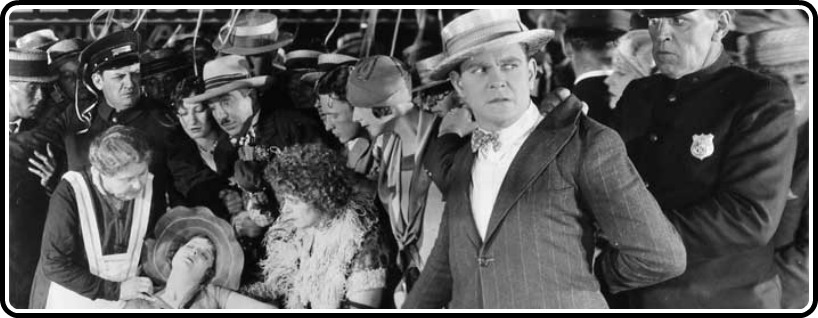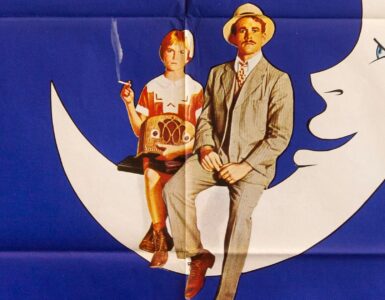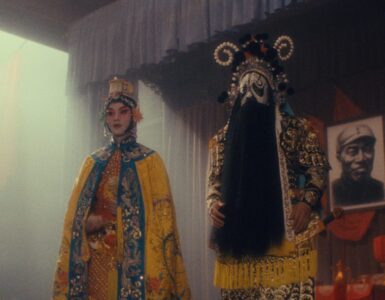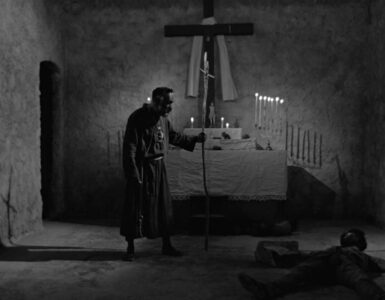Silent cinema is quite an intriguing beast. The basis of everything that we know today cinematically, at least visually, the early decades of feature-length filmmaking also prove to have some of the most interesting narratives that cinematic history has to offer. Be it the entire romantic relationship of a couple told through one boat ride in L’Atalante or the trial of Joan Of Arc in The Passion Of Joan Of Arc, silent cinema may not feature talking, but what they do feature are some of the most breathtakingly emotive performances in film. Wrapped up in truly inventive filmmaking, silent cinema may in fact be the most potent era for films with the ability to enrapture the audience in a cavalcade of emotions.
Be it comedy like Chaplin or Keaton features, or the broad sweeping romance that is featured in Lonesome, now readily available for the first time thanks to a brand spanking new DVD and Blu-ray from The Criterion Collection, this era has bred some of the most historically important features in film. And now, we can all bask in one of the greatest unsung gems of the end of that very era.
Lonesome‘s narrative isn’t the most dense. Following the story of two people, a man and a woman, in New York, Lonesome tells the tale of two star-crossed lovers, over the span of one fateful Saturday night on Coney Island. Recently inducted into the National Film Registry back in 2010, and also recently restored by George Eastman House via a foreign print (more on that soon), the film is now available for the first time on Blu-ray in an absolute wonder of film restoration and recovery.
Produced by Universal and released in 1928, the film is remarkably small for a studio that would later become home to some of the most iconic epics and event films of their eras. Director Paul Fejos is best known for this film as well as his various works on for-hire projects like the cavalcade of remakes that he would helm during his time behind the camera, the film’s narrative is admittedly broad. With social worries playing under the surface, the film’s main focus is on what is truly the story of a man, and a woman.
Starring the pair of Glenn Tryon and Barbara Kent, the film’s performances are charming and entertaining, with each playing the polar opposite of the other. Tryon is lovable, goofy and over the top, first being seen as he rushes to get ready for a day at work. Kent is equally as great here, as the much more melancholy and pensive romantic interest, Mary. The film thrives when the two are on-screen alongside one another, be it their first meeting, or the moment in which the pair truly escape to what appears to be another plane of existence, dancing by themselves in a fog tinted dreamscape. Both give theatrical performances, as the film itself feels quite stage-centric, but it works for a narrative as broad as Lonesome truly is.
Director Steven Spielberg once said of Stanley Kubrick that, where most filmmakers painted on their canvases with detailed lines and strokes, he started off with giant, primary colored strokes, only to hammer out themes organically. The same can be said here for Fejos and his masterpiece.
Opening up with proto-experimental shots of New York City, Lonesome is as much about human intrapersonal relationships as it is about our then burgeoning relationship with technology, urbanization and industrial expansion. Very much in the vein of fellow Criterion-approved silent masterwork People On Sunday, Lonesome weaves a romantic tale around the ideal of late ‘˜20s isolation that was brought on by quite fast industrial growth. However, unlike the aforementioned German masterwork, the film doesn’t express this fact as its thesis, instead offering it as food for thought under the cover of a moving romantic feature that also attempts to expand the filmmaking language.
Using experimental techniques in its editing and the superimposition effects that are abound within this film, as well as those subsequently found in this release (both of which are absolute gems, one of which this writer quite prefers, The Last Performance), the film does also come with three ‘talkie’ sequences, but none of which live up to the rest of the film’s absolute beauty. Seemingly inspired by early surrealist and expressionist works, especially in its use of stark angles and stunning, contrast-heavy lighting, the film blends various influences from the earliest days of cinema, primarily foreign works, and turns its light on a narrative so utterly infatuated with the most American of cities, New York City.
Based on a restored print from George Eastman House, the film is in admittedly rough shape. Universal, at a time of downsizing and due to fears of looming insurance costs, burned each and every silent film print that they had stored away, including early silent prints of this film. Thankfully, some foreign prints still existed, thus the fact that this film is not as crisp as one would imagine. The transfer on the Blu-ray looks superb given its constraints, and the score is top-notch. A commentary track is also found on the featured film here, one that for a 70 minute film, will make returning to it quite easy.
Also joining Lonesome are two Fejos features, The Last Performance and what was at the time Universal’s most expensive film, Broadway. Both films also feature subpar source materials, so the transfers are admittedly rough, but the former is an absolute masterpiece. It stars Conrad Veidt and includes all the style of Fejos’ Lonesome, but wrapped up in a magic-focused thriller narrative, really playing to the director’s strengths. Broadway is the weakest of the three films featured here, but is absolutely stunning visually, and quite the musical. Finally, there is a video essay narrated by Fejos, telling the story of his life and his work, as well as an interview with cinematographer Hal Mohr.
All in all, while it’s not every day that Criterion brings us a new release of a silent film, they have once again knocked it out of the park. Asides from their Chaplin releases, new Blu-rays of films like this, Sunday and the thriller The Phantom Carriage prove that while people have called truly classic films as irrelevant to today’s generation, those death notices are coming at a time where they are seeing their greatest resurgence. And Criterion is leading that pack.







![Bergman Island (The Criterion Collection) [Blu-ray]](https://criterioncast.com/wp-content/uploads/2022/11/bergman-island-the-criterion-collection-blu-ray-400x496.jpg)
![This Is Not a Burial, It’s a Resurrection (The Criterion Collection) [Blu-ray]](https://criterioncast.com/wp-content/uploads/2022/11/this-is-not-a-burial-its-a-resurrection-the-criterion-collection-blu-ray-400x496.jpg)
![Lars von Trier's Europe Trilogy (The Criterion Collection) [The Element of Crime/Epidemic/Europa] [Blu-ray]](https://criterioncast.com/wp-content/uploads/2022/11/lars-von-triers-europe-trilogy-the-criterion-collection-the-element-of-400x496.jpg)
![Imitation of Life (The Criterion Collection) [Blu-ray]](https://criterioncast.com/wp-content/uploads/2022/11/imitation-of-life-the-criterion-collection-blu-ray-400x496.jpg)
![The Adventures of Baron Munchausen (The Criterion Collection) [4K UHD]](https://criterioncast.com/wp-content/uploads/2022/11/the-adventures-of-baron-munchausen-the-criterion-collection-4k-uhd-400x496.jpg)
![Cooley High [Criterion Collection] [Blu-ray] [1975]](https://criterioncast.com/wp-content/uploads/2022/11/cooley-high-criterion-collection-blu-ray-1975-400x496.jpg)